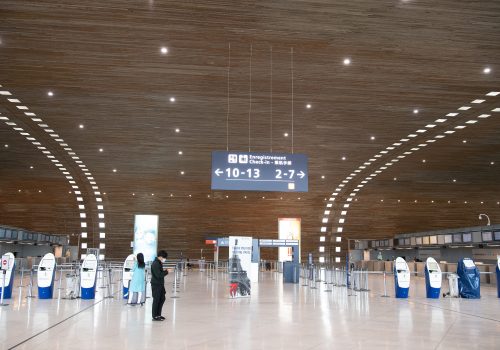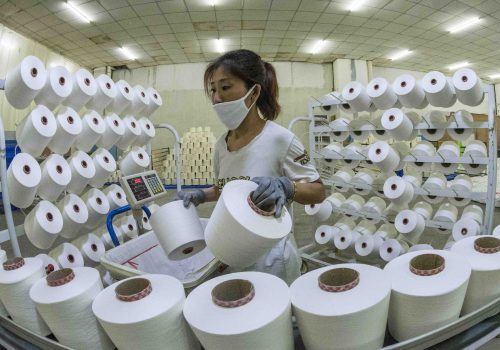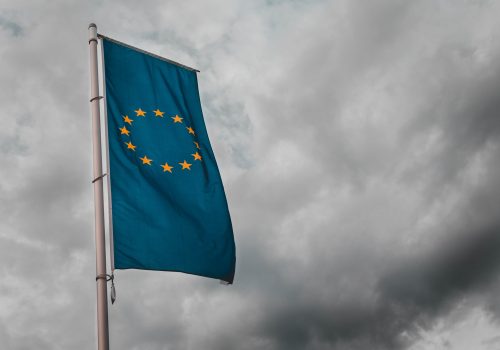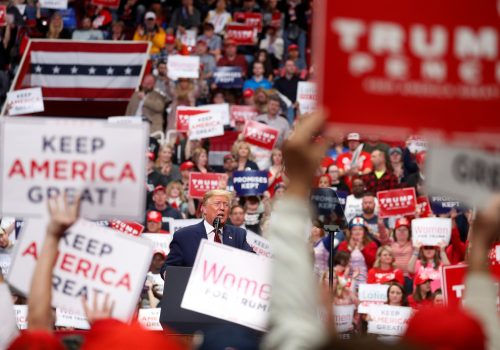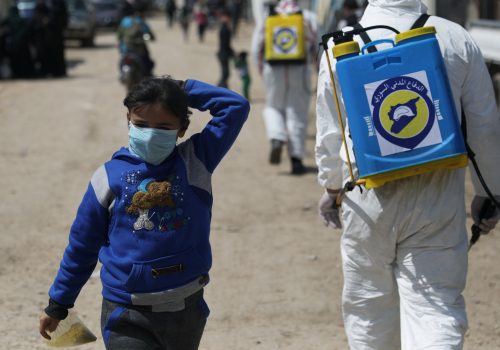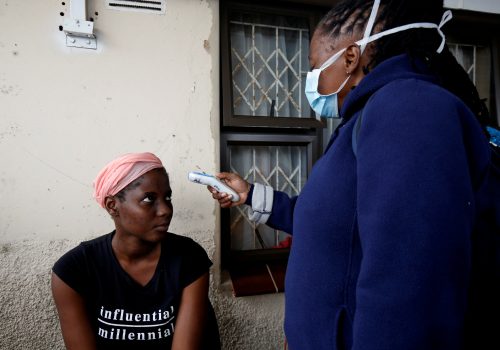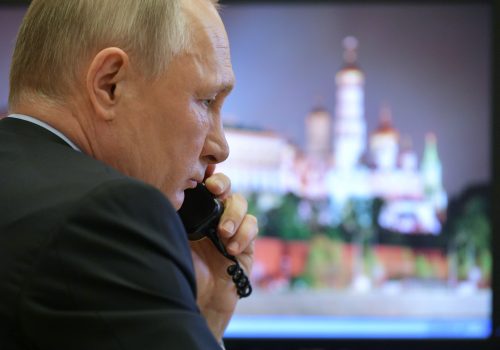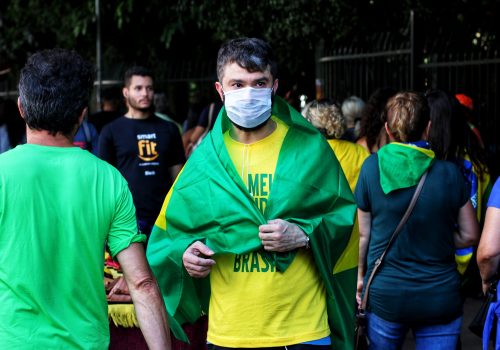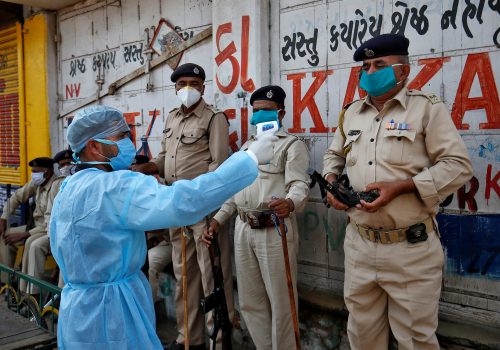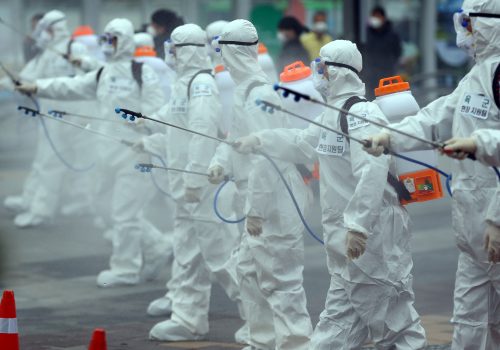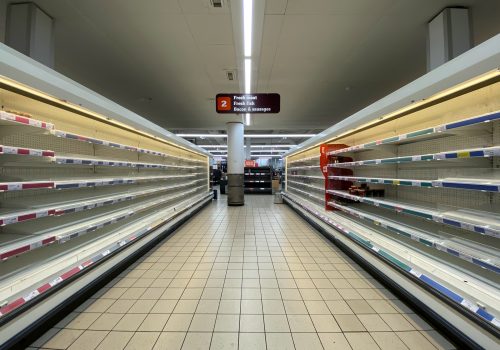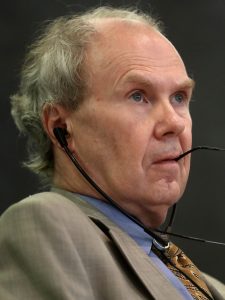Middle East in turmoil even before pandemic hit
The pandemic struck a Middle East that was already laboring under overlapping political, economic, security, and humanitarian crises.
There are deep concerns about how long stability can be maintained in the face of these multiple crises, considering the pandemic’s turbulent effects on a region characterized by turbulence.
The full text of the paper is split across the various articles linked below. Readers can browse in any order. To download a PDF version, use the button below.
Governments across the region have put social distancing and other measures into place, policies made urgent given that the virus arrived in the region early, via Iran, and with deadly impact.
Yet perhaps more than anywhere else in the world, the region’s governments are facing intense and often contradictory pressures resulting from the need to protect public health and promote economic recovery while ensuring political stability.
One significant dilemma is that the region’s public health systems could be swamped if social distancing is lifted and the pandemic explodes. Iran, the region’s early epicenter, began reopening in April only to see its cases surge in May, threatening not only to eliminate any fragile economic recovery but also reignite the pandemic.1Farnaz Fassihi, “Iran Sees New Surge in Virus Cases After Reopening Country,” New York Times, May 18, 2020, https://www.nytimes.com/2020/05/18/world/middleeast/iran-coronavirus-surge.html. Similar outbreaks occurred in Gulf Cooperation Council (GCC) states after governments lifted restrictions over Ramadan, causing them to reinstate lockdowns and other measures.2Sarah Dadouch, “Saudi Arabia, Other Gulf States Reimpose Strict Measures After Coronavirus Cases Spike During Ramadan,” Washington Post, May 20, 2020, https://www.washingtonpost.com/world/middle_east/saudi-arabia-and-other-gulf-states-reimpose-strict-measures-after-coronavirus-spikes-during-ramadan/2020/05/20/e24bb7c8-99df-11ea-ad79-eef7cd734641_story.html.
In those countries hit hardest by conflict (Iraq, Syria, Yemen), weak or nonexistent public health systems plus ongoing violence and mass displacement means that humanitarian worst-case scenarios are possible. (On-the-ground reporting from Yemen indicates that a pandemic-driven crisis already is underway; in contrast, evidence from the region’s many Syrian refugee camps mercifully suggests that the camps thus far are spared the infection, if not the social and economic fallout.)3“Doctors Without Borders Warns of Covid-19 ‘Catastrophe’ in War-Torn Yemen,” France24, May 21, 2020, https://www.france24.com/en/20200521-doctors-without-borders-warns-of-covid-19-catastrophe-in-warn-torn-yemen; “Yemen: Coronavirus Transmission Likely Widespread, Decimating ‘Collapsed’ Health System, UN Warns,” UN News, May 22, 2020, https://news.un.org/en/story/2020/05/1064742; “Syrian Refugees in Lebanon More Scared of Starvation Than COVID-19,” Deutsche Welle, May 6, 2020, https://www.dw.com/en/syrian-refugees-in-lebanon-more-scared-of-starvation-than-covid-19/a-53355378.
The pandemic’s long-range impacts will add to the region’s list of structural challenges. That list starts with economic reform. For the major oil- and gas-producing states (the GCC member states, Iran, Iraq, Libya, Algeria), the pandemic’s impact is revealing, once again, the dangers of being overly reliant on hydrocarbons for economic growth.4Chloe Cornish and Asmaa al-Omar, “Iraq Warns Over Threat to Public Sector Pay from Oil Price Collapse,” Financial Times, April 8, 2020, https://www.ft.com/content/3afc240b-2a3d-49df-b3c5-f5427222a5d9.
Driven by a collapse in global demand and a glut in supply, during the spring of 2020, global oil prices slid to rock-bottom levels. Although prices have stabilized, sustained lower oil prices are likely given the odds of an ongoing global recession.
Will COVID-19 slow the global shift to renewable energy?
In the short-term, the pandemic almost certainly reduces greenhouse gas emissions due to lower energy demand.
But that shift is a two-edged sword. Innovation and adoption of green technology accelerates when fossil fuel prices are high and decelerates when they’re low.
Moreover, many of the parts for large-scale green energy programs come entirely or partially from China, other parts of Asia and the United States. These specialized supply chains have few substitutes. As an example, the pandemic has already slowed Chinese production of solar panels, delyaing projects in India and Australia.
One way to mitigate existing low prices would be through increased taxes on fossil fuels, which would help to incentivize continued changeover to renewables.
Moreover, the tourism industry, a major part of the economy of several countries (the United Arab Emirates, Saudi Arabia, Israel, Egypt, Turkey, Jordan, and more), has also taken a substantial hit.5Andrew England and Heba Saleh, “Arab World’s Middle-Income Nations Face Tough Coronavirus Choices,” Financial Times, April 8, 2020, https://www.ft.com/content/13f690dd-ce12-4c20-a158-630911befb53. Impacts on employment and government revenues are already severe.
For the region’s governments, the pandemic opens up yet another structural challenge: the legitimacy of their rule. Although governments the world over are facing their constituents’ frustrations amidst the pandemic, nowhere is the legitimacy issue more acute than in the Middle East.
Although temporarily stilled by COVID-19 lockdowns, simmering discontent with social, economic, and political conditions is never far from the surface across much of the region. Multiple governments have instituted measures designed to eliminate public criticism of their pandemic responses.6Robin Wright, “Can the Middle East Recover from the Coronavirus and Collapsing Oil Prices?,” New Yorker, May 8 2020, https://www.newyorker.com/news/our-columnists/can-the-middle-east-recover-from-the-coronavirus-and-collapsing-oil-prices; Sudarsan Raghavan, “As Coronavirus Spreads in Egypt, Sissi Sees Opportunity to Tighten His Grip,” Washington Post, May 10, 2020, https://www.washingtonpost.com/world/africa/as-coronavirus-spreads-in-egypt-sissi-sees-opportunity-to-tighten-his-grip/2020/05/10/11a840be-92a5-11ea-87a3-22d324235636_story.html; Andrew England, “Coronavirus Deepens Frustrations of Young in Middle East,” Financial Times, April 27, 2020, https://www.ft.com/content/6c346c85-8d01-4242-81f5-314a7db0958f.
Over the longer run, it is unclear whether governments will be able to prevent pandemic-driven mass dissent along the lines of the Arab Spring, now nearly a decade in arrears.
How the region’s geopolitical reshuffling will be impacted is equally unclear. The regional powers all face their own internal (domestic) public health, economic, political, and security challenges related to the virus. Of these, both Saudi Arabia and Iran face the oil producers’ dilemma as described above.
Although neither will escape unscathed, Iran arguably is in a worse position owing to the double impact of ongoing US sanctions, which have affected its ability to sell its oil (even at a reduced price) and to repatriate revenues from sales abroad.7Ali Dadpay, “A Loan for Iran and a Tragedy of a Different Kind,” IranSource, March 23, 2020, https://atlanticcouncil.org/blogs/iransource/a-loan-for-iran-and-a- tragedy-of-a-different-kind/.
For non-regional powers that historically are most active in the region, specifically the United States, Europe, and Russia, the pandemic raises two questions: how will the pandemic force them to reevaluate their interests in the region, and how much are they willing to invest in the region going forward?
It is not a stretch to imagine that many allies fear a hard-hit and divided United States will be even less willing to engage than before.
See where US leadership is most vulnerable
Related Content
About the authors
Image: An internally displaced Syrian girl wears a face mask as members of the Syrian Civil defence sanitize the Bab Al-Nour internally displaced persons camp, to prevent the spread of coronavirus disease (COVID-19) in Azaz, Syria March 26, 2020. REUTERS/Khalil Ashawi
